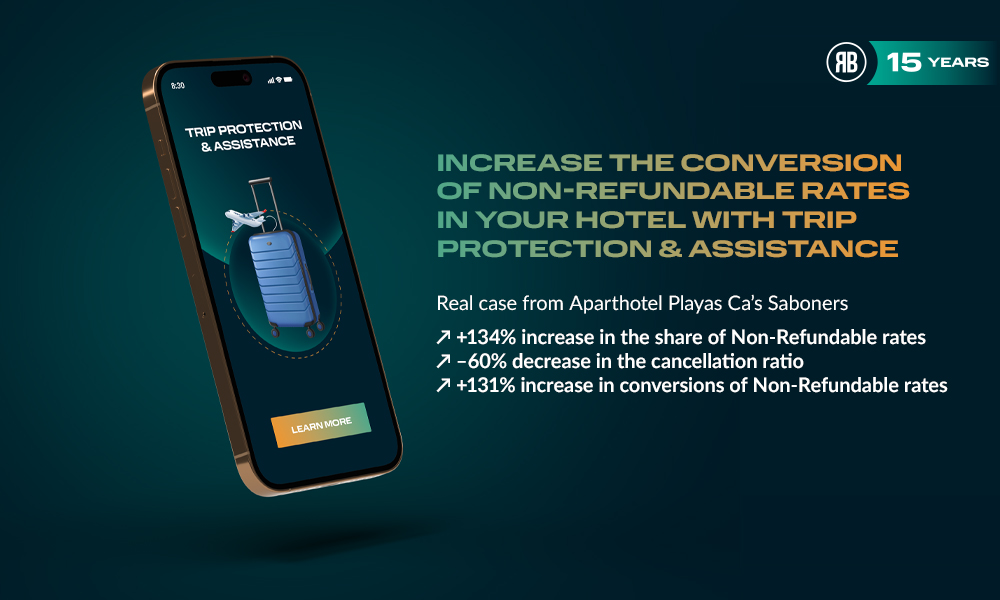Hotel marketing and sales, a necessary reflection
News
October 10, 2019

It is evident, and no one can deny it, that the way of marketing hotels has changed and that the forms of marketing have changed. But, meanwhile, has the criteria of those who make decisions that affect this new marketing also changed? Is there an awareness of what the radical transformation that the digital age has brought about entails and requires? Everyone can analyze their known cases and reflect on the subject.
LET'S DO A LITTLE HISTORY: THE PAST
Hotel marketing has been prosperous, adapting to a parallel global prosperity. Adapting and expanding for the sake of corporate business needs, the growing social need to travel and the new ease for leisure consumption.
Hotel occupancies and hotel business development initiatives were responding to the demands generated by a critical mass always led by the fortunate presence of intermediaries with the ability to approach the final customer. Let's say that "things, until now, have always been working well" so there has not been much to change or invent.
For hotels, practically until very recent dates, the option of addressing the customer directly was null, almost impossible, so they had to sustain their marketing on those blessed collaborating agents, in their different formats, depending on the type of product or destination. Travel agencies in all their various modalities.
The oldest among us will remember that in hotels direct customers were called with the peculiar term of "passers-by". That said it all. It was impossible to consider a supposed campaign to attract "passers-by" for which the return on investment (ROI) would always be excessive. Unthinkable.
In such circumstances, "marketing" meant collaborating with the aforementioned agents or market distributor players, which required great negotiation skills, contracting and, of course, capacity and willingness for public relations.
The good Commercial Director should have a wide network of contacts, with whom he should maintain a very good relationship and with whom it was necessary to meet regularly. In person, of course. Being a good Commercial Director involved in the position total availability to travel to meet with the decision makers of the client distributors in their cities of origin and in the major annual events or trade-shows.
Since hotel marketing was always supported by "retail" partners or "wholesale" partners who marketed, in turn, with third-party retailers, any action of generation or promotion or brand consolidation, let's call it "Marketing", had to be negotiated with these, who were the ones who really put in place the necessary actions with the means of then to get "hook" the final customers or future guests.
True marketing campaigns, some surprising and brilliant that, by themselves, provoked inspirational moments or processes in the consumer. That was the mission.
In many cases, these marketing campaigns were presented with a shared double personality that, at least on paper, was supposed to be carried out "sharing" also the investment they required. It was called "co-marketing".
Such were those not so distant times.
Let's go back to the figure of that Commercial Director of a hotel or hotel chain.
Within his commercial and contracting tasks he also had to negotiate with those agents (tour operators, consortia, or travel agencies) that type of marketing initiatives that were understood as necessary and that were achieved successfully thanks to his excellent skills described above. Therefore, the control of the marketing budget was also implicit in the position. With which, we already had Commercial and "Marketing" Director. A heroic figure of direction, engine of sales, with very good disposition and commercial and negotiation skills. And what about marketing?
NOW EVERYTHING HAS CHANGED: THE PRESENT
The inspiration or need to travel is no longer aroused by those brilliant campaigns. Neither the famous Curro who goes to the Caribbean; nor the fashionable actor on television; nor those ads in the travel catalogs and Iberia magazines with white sand beaches full of coconut trees. The customer now receives and feels the inspiration in other areas. Today, those marketing or co-marketing initiatives are quite futile. Let's say they serve very little, or nothing.
It is evident that the concept of marketing has changed and that we must get fully involved in it. The direct customer in his concept of "passer-by", fortunately, already "passed". Now it is a close, curious and interested omnipresent Internet user with a very high degree of proactivity, who seems to have caught many hotel organizations and management boards off guard.
The heroic "one-man band" is no longer enough. It is essential to know about marketing. Real marketing. Moreover, it is a different kind of marketing where there is no room for harassing the customer or bombarding them with messages that we believe are inspiring. Now, actions must be directed towards finding the curious and needy customer, who is searching online to be satisfied with the perfect option for the travel or vacation model that they have created themselves with all the information received in the new environments in which they move and breathe. These are new media that have enveloped us all without exception: search engines, streaming videos, messaging, metasearch engines, social media, etc.
Those collaborating agents that hotels relied on for any brand action are no longer useful. Perhaps they have already disappeared as such or are on the verge of extinction. Some have become obsolete, outdated figures whose only way out is specialization in very specific market niches, and others have discreetly changed their role from agent to simple channel, and I emphasize the word channel, because it is not simple at all.
The customer is now closer than ever to the hotel, just a click away, if you'll pardon the cliché. The hotel must embrace and get involved in this new Inbound Marketing model and implement all the tools and solutions at its disposal to present itself as a candidate option relevant to what the customer is looking for. It must perfectly know its "buyer persona" and direct all efforts and budgets towards them with precision. Welcome to Digital Marketing.
Definitely, and for some time now, the moment has come to dissociate that role of Commercial Director with a gift for people, incorporating a true Marketing team specializing in digital. And, with all due respect, it is much better if that responsibility lies with natives of the digital age instead of continuing to use previous generations, no matter how many medals from other battles they may have on their record.
Many organizations should, with humility, take this brave step and unlock a wide path of success and opportunity that would allow them to compete on equal terms with the few pioneers who are already ahead, or with the very large international chains that understood it years ago.
We see every day the tremendous respect that is illogically given to the different options or opportunities for investment in digital marketing. Even when a high and evident return on investment is demonstrated, and millimeter-precise measurements of results and traceability are available that would never have been dreamed of. The only explanation is that such respect only responds to the fear of the unknown. To what is not known by those who inherited the responsibility of the brand from other times and who must now decide on modern concepts that are incomprehensible to them and that directly affect the use of a meager budget from the account of that initial marketing that no longer exists as such.
The sad dilemma arises of not taking advantage of this very clear opportunity for the sole reason of not understanding it. And it is also worrying that there is no intention to understand, since whoever must decide is sedated by the constant reservations that are arriving daily from the intermediaries between the hotel and that final customer, who is much more accessible than it seems.
Of course, it was much more comfortable before when the responsibility for managing and promoting the brand fell on that partner of co-marketing; when the supposed success of those investments was only measured by the sales generated by the agencies or tour operators that were reviewed once a year through accumulated and mixed data when renewing contracts in those pleasant and long business lunches.
On the other hand, now that the "prodigal son" DIRECT CUSTOMER has appeared, let's think about whether the same traditional dynamics should be followed commercially. Definitely not.
The distributor, formerly an agent, now called OTA, must comply with the new rules of the game since its role has changed significantly. It is no longer the one that generates business, it has already lost that merit. Let's remember that it is a simple channel, that path that the customer takes to get to the hotel. In many cases, because it turns out to be the easiest access route, since these new intermediaries have excellent means and resources to present themselves first to that consumer who has started their "booking journey". Resources that, by the way, the hotel pays for through commissions on the sale that are agreed upon. Commissions very well earned and deserved as long as they are used for what they were really contracted for, which was nothing more than to gain access to those customers that the hotel cannot reach by its own means. Therefore, when the OTA interposes itself in the path between the customer and the hotel, it is seriously and blatantly violating the rules of the game. Then that commission is not so deserved.
It is curious that some salespeople are still reluctant to address the customer directly with the explicit intention and objective of achieving their loyalty and, consequently, their next direct booking. Just as it is incomprehensible that an online agency claims that loyalty for itself, which is the hotel's most sacred asset.
That customer is as legitimate to the hotel as the commission is to the agency for having obtained it the first time. That's the end of the deal.
Read more







